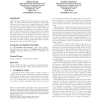Free Online Productivity Tools
i2Speak
i2Symbol
i2OCR
iTex2Img
iWeb2Print
iWeb2Shot
i2Type
iPdf2Split
iPdf2Merge
i2Bopomofo
i2Arabic
i2Style
i2Image
i2PDF
iLatex2Rtf
Sci2ools
108
click to vote
DRM
2005
Springer
2005
Springer
Fairer usage contracts for DRM
DRM has been widely promoted as a means to enforce copyright. In many previous papers, it has been argued that DRM gives too much power to rights holders and actually goes beyond the restrictions provided by copyright laws. In this paper we argue that DRM does not actually implement the fundamentals of copyright law, and is rather a mechanism for enforcing licence and contract restrictions on digital data. However, we believe that DRM does have a place in the digital distribution of copyrighted works and present two mechanisms that would allow users to get a more balanced deal from the rights holders. The mechanisms we present also allow for newer business models that cannot be easily implemented with current DRM systems. Categories and Subject Descriptors K.4.1 [Computers and Society]: Public Policy Issues— Intellectual property rights; K.5.1 [Legal Aspects of Computing]: Hardware/Software Protection—Copyrights, Licensing General Terms Design, Languages, Legal Aspects, Security K...
| Added | 27 Jun 2010 |
| Updated | 27 Jun 2010 |
| Type | Conference |
| Year | 2005 |
| Where | DRM |
| Authors | Alapan Arnab, Andrew Hutchison |
Comments (0)

